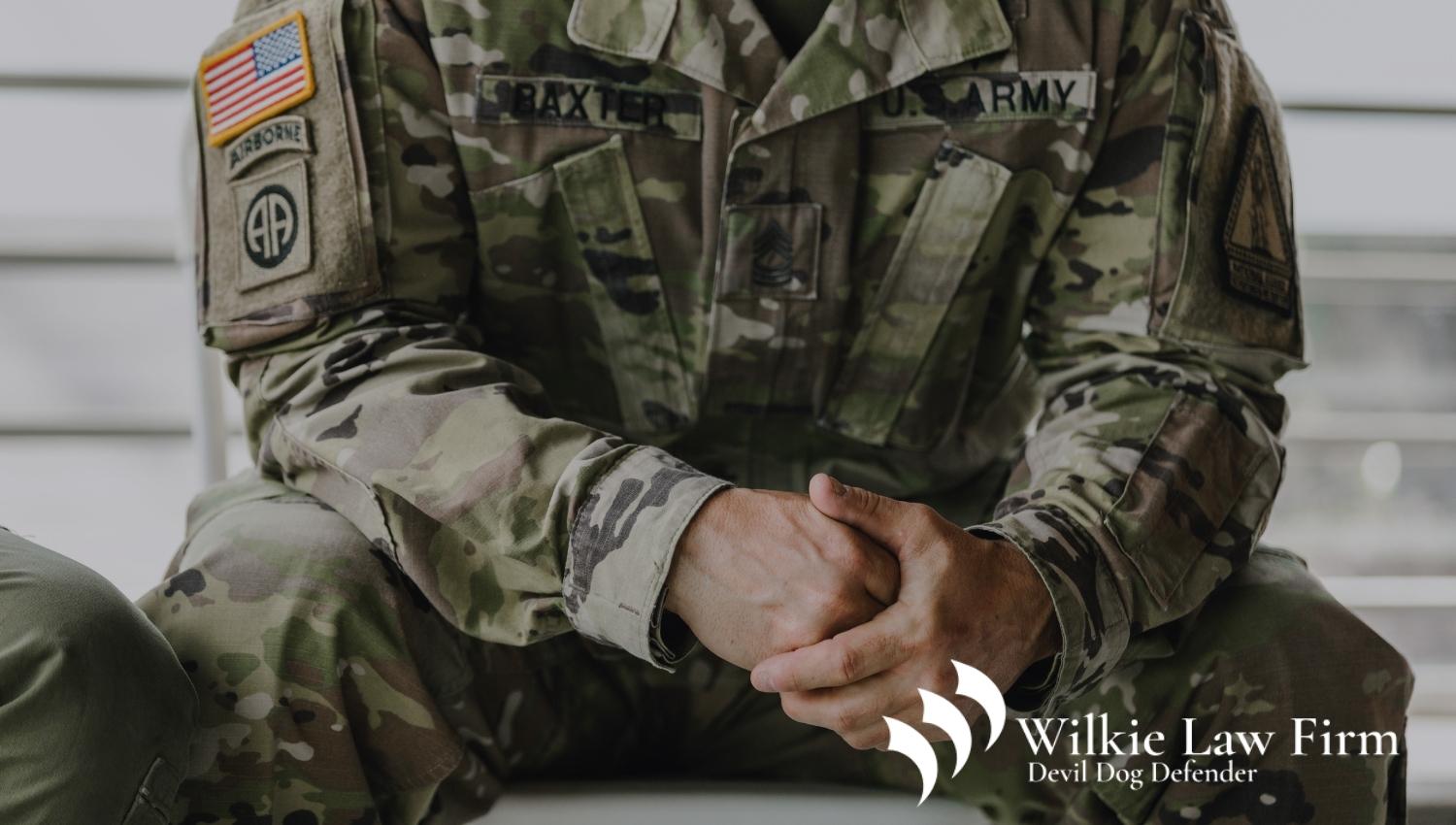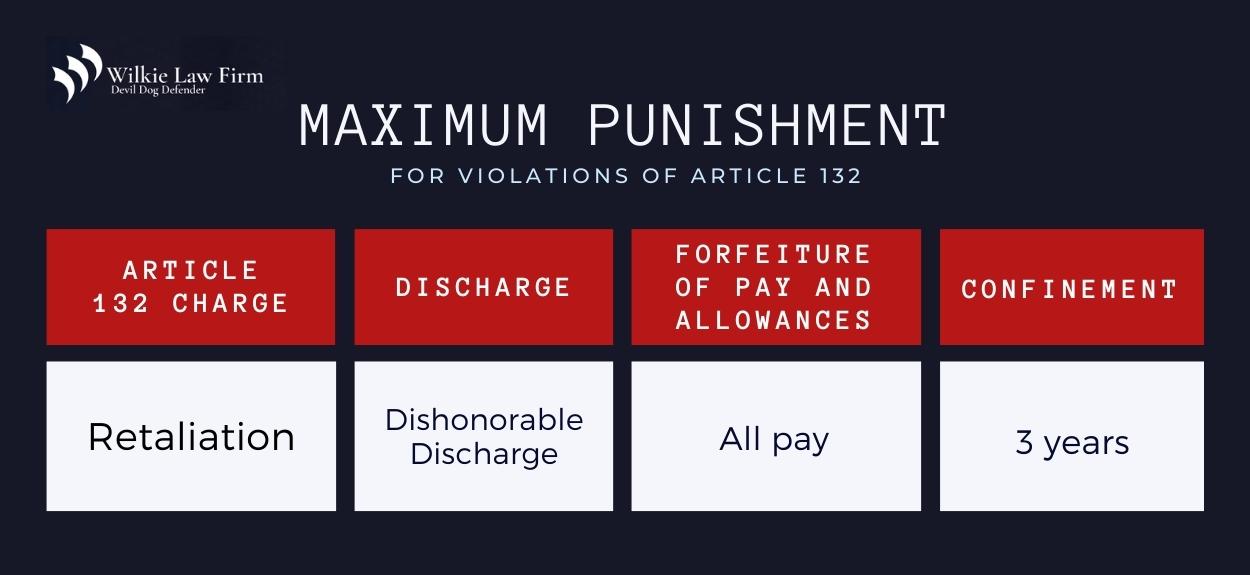Article 132 UCMJ
Military Defense Attorney for Article 132 Violations
Home » UCMJ Articles » Article 132 UCMJ
Military Counsel
UCMJ Articles
UCMJ Article 132 - Retaliation
Table of Contents
Members of the U.S. armed forces operate under a specific set of rules detailed in the Uniform Code of Military Justice (UCMJ). This Code is similar to the U.S. Constitution for the general public, as it lists different articles that cover specific rights and violations of military law. However, the standards within the UCMJ Articles are frequently more stringent than those in the Constitution, given the heightened moral and behavioral expectations placed on military personnel.
If a military individual does not meet these rigorous standards, they can face charges under the UCMJ. One such charge revolves around the act of retaliation. Here, experienced North Carolina military defense lawyer Aden Wilkie from the The Wilkie Law Group covers UCMJ Article 132, which addresses retaliation-related offenses within the military.
What is Article 132 of the UCMJ?
Article 132 of the UCMJ (10 U.S.C. 932) covers the criminal offense of Retaliation in the military. This UCMJ rule addresses the misuse of otherwise lawful military authority to retaliate against someone for reporting a crime or for sharing protected information. It’s an offense to take, threaten, or withhold actions with the intention of retaliation or to discourage someone from reporting a crime or sharing such information. Anyone under the UCMJ can commit this offense if they misuse their authority in personnel matters with this specific intent. However, this rule doesn’t prevent the legitimate use of command authority to discipline or reward service members.
The exact text from the Manual for Courts-Martial is as follows:
“Any person subject to this chapter who, with the intent to retaliate against any person for reporting or planning to report a criminal offense, or making or planning to make a protected communication, or with the intent to discourage any person from reporting a criminal offense or making or planning to make a protected communication—
(1) wrongfully takes or threatens to take an adverse personnel action against any person; or
(2) wrongfully withholds or threatens to withhold a favorable personnel action with respect to any person;
shall be punished as a court-martial may direct.”

Important Terms and Definitions
In order to understand the violation of retaliation as it pertains to UCMJ Art. 132, one must fully understand the text of the statute. Below, we’ll provide definitions of some of the common terms included in this Article.
Protected Communication Definition
A “protected communication” may mean a lawful communication to a Member of
Congress or an Inspector General OR a communication to a covered individual or organization in which a member of the armed forces complains of (or reasonably believes constitutes
evidence of):
- A violation of law or regulation, including a law or regulation prohibiting sexual harassment or unlawful discrimination.
- Gross mismanagement, a gross waste of funds, an abuse of authority, or a substantial and specific danger to public health or safety.
Unlawful Discrimination Definition
“Unlawful discrimination” includes any type of prejudice or unfairness towards a service member based on race, color, religion, sex, or national origin.
Reprisal Definition
In the context of the Uniform Code of Military Justice (UCMJ), a “reprisal” typically refers to retaliatory actions taken against service members, especially for reporting misconduct, wrongdoing, or for making a protected communication. It’s essentially a form of revenge against someone for performing a lawful action, such as whistleblowing.
Personnel Action Definition
“Personnel actions” refer to any decision or action that impacts a military member’s job or career. This can include things like promotions, discipline or corrective action, job changes, and performance evaluations. Other personnel actions include decisions about pay or benefits, removal from duty, discharges, mental health evaluations, and other job-related matters as set by law or rules.
Intent to Retaliate Definition
“Intent to retaliate” means the action was done as payback or revenge for someone reporting a crime or sharing protected information. This includes taking, not taking, or even threatening such actions.
Elements of Article 132
When a service member faces a retaliation charge under UCMJ Article 132, the prosecution must be able to prove certain elements existed in order to secure a conviction. These required elements include the following:
Retaliation
- The accused wrongfully (1) took or threatened to take an adverse personnel action against any person OR (2) withheld or threatened to withhold a favorable personnel action with respect to any person;
- At the time of the action, the accused intended to retaliate against any person for reporting or planning to report a criminal offense, or for making or planning to make a protected communication.
Discouraging a Report of Criminal Offense or Protected Communication
- The accused wrongfully (1) took or threatened to take an adverse personnel action against any person OR (2) withheld or threatened to withhold a favorable personnel action with respect to any person;
- At the time of the action, the accused intended to discourage any person from reporting a criminal offense or making a protected communication.

Article 132 UCMJ Retaliation Punishment
If a service member is found guilty of breaching UCMJ Article 132, they could face severe penalties, including losing their military benefits, serving time in military prison, or even being discharged from the service. Below, we’ll outline the maximum punishments provided for the offense of retaliation under UCMJ Article 132:
- Forfeiture of all pay and allowances;
- Confinement for up to 3 years;
- Dishonorable discharge.
Military Defense Attorney for UCMJ Article 132 Violations
If you’re confronted with a UCMJ Article 132 violation or any other charges under the UCMJ Articles, it’s crucial to understand the intricacies of the military justice system and the potential repercussions. Trying to handle these charges on your own can be an uphill battle. Remember, the prosecution will be fully prepared and dedicated to proving your guilt, seeking the harshest penalties applicable by law. To effectively counter this, you need a skilled military defense attorney like Aden Wilkie by your side who will passionately advocate for your rights, liberty, and military career.
At The Wilkie Law Group, we’re not just a team of lawyers; we’re your allies in the courtroom. Our North Carolina criminal defense attorneys are committed to offering top-tier legal representation by meticulously analyzing every piece of evidence and crafting a solid defense strategy tailored to your individual circumstances. Don’t wait any longer – reach out to a member of our team today to get started.
Contact an Article 132 Defense Attorney
You’ve dedicated yourself to serving your nation; now, let us give back by protecting your future and supporting you during this difficult period. Get in touch with our experienced legal team for a confidential consultation by calling (910) 333-9626 or filling out our convenient online contact form today.




